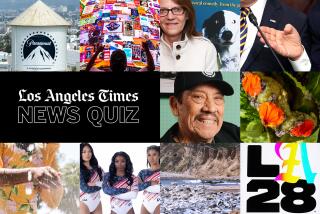All the News That Fits in the Top 10
- Share via
While in Beijing recently, Louis Schor clipped a box from the International Herald Tribune listing the top 10 20th-Century news stories in two categories--single events and long events.
It may be early in the century to be summing it up, since it doesn’t end until midnight, Dec. 31, 2000; but we can hope that nothing more cataclysmic than the events we have already had will occur in those 13 years.
Of course, no amount of astronomical or mathematical calculations will disabuse most people of the notion that the century will end at midnight on Dec. 31, 1999. Even though it doesn’t, that date will be celebrated as “the turn of the century” throughout the world.
Picking the century’s most important or memorable news event is an open sport, like picking a horse or an Oscar winner. We don’t have to have a degree or a license. Inevitably, we will measure the century’s events by how they affected us personally.
The Herald Tribune’s 10 top stories (single events) are: (1) Jack Kennedy’s assassination; (2) Bolshevik revolution; (3) moon landing; (4) Hiroshima atomic bomb; (5) Hitler launches WW II; (6) Wall Street crash; (7) birth control pill; (8) Pearl Harbor; (9) Independence of India; (10) Lindbergh’s flight.
I can’t quarrel with any of those, especially since the “long events” include some that seem to be missing, among them the Holocaust, the human rights movement and the Vietnam War.
The birth control pill, though it did not have the immediate impact of Pearl Harbor, was indeed a story of the century, giving rise to two other big stories--the sexual revolution and the feminist revolution, both of which have helped to shake our society out of the 19th Century.
Evidently the Tribune means to list the stories in order of their importance; if so, I question the order. No news event of my lifetime hurt me as deeply and immediately as Kennedy’s assassination; but tragic as it was to those of us who believed in the new Camelot, it did not alter our lives in the way that Pearl Harbor and the atomic bomb did.
As dramatic as the moon landing was, it does not seem to have thrilled us the way Lindbergh’s flight did, even though we had no television to show it over and over in our homes. The moon landing has not yet fired the imagination of the earthbound or led to further explorations of space by man. Its heroes have fallen back almost into anonymity. Its main social effect has been to inspire the question, “If we can go to the moon, why can’t we . . . ?” Usually followed by some trivial goal, like curing a hangover.
I can’t believe that Pearl Harbor wasn’t more important than the Kennedy assassination. I was in Honolulu; we all knew instantly, as everyone else in the nation did, that our lives were profoundly changed.
What fascinates me is the perversity of consequences. When the Japanese bombed Pearl Harbor, even some of Japan’s own military men and statesmen foresaw that it meant the end of Japan as a power. They knew that in bringing the United States into the Pacific War they had sealed their own doom. Yet, today Japan is one of the three most successful industrial democracies in the world, and its products are found in every American household. Who foresaw that?
I assume that the Wall Street crash referred to is the one of Oct. 24, 1929, not Oct. 19, 1987. I heard about it, but I didn’t see how it could affect me. That crash brought on the Great Depression, which was lifted, again ironically, only by the greater calamity of World War II.
When the bomb was dropped on Hiroshima, I was in the Marines on Maui; our next assignment was the invasion of the Japanese home island of Kyushu. I did not expect to survive it. The bomb ended the war and probably saved my life.
That raises the agonizing question: If I could undo Hiroshima and allow Kyushu, would I? Keep in mind that the death toll on Kyushu would probably have been higher than that of Hiroshima (although Norman Cousins, in his book “The Pathology of Power,” argues that the estimate of American deaths was grossly exaggerated). I can only answer that I am not God.
I think I will celebrate the end of the century a year early. Let’s get it over with.


